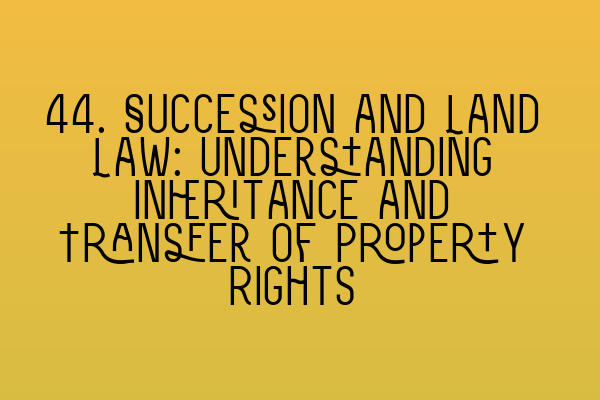Succession and Land Law: Understanding Inheritance and Transfer of Property Rights
Welcome to SQE Property Law & Land Law, where we provide expert legal advice and support in the field of property law. In this blog post, we will be discussing the important topic of succession and land law, specifically focusing on understanding inheritance and the transfer of property rights.
Before we delve into the details, let’s briefly explain what succession and land law entail. Succession refers to the legal process by which an individual’s property, assets, and rights are transferred to their heirs after their death. On the other hand, land law deals with the regulations and principles related to the ownership, use, and transfer of land and property.
Understanding Inheritance
Inheritance is the process by which an individual receives property, assets, or rights from a deceased person. It involves the transfer of ownership and legal rights from the deceased, known as the testator, to one or more beneficiaries, who are typically family members or individuals named in the testator’s will.
When a person passes away, their estate goes through a legal process known as probate. The probate court oversees the distribution of assets according to the testator’s will or, if no will exists, according to the laws of intestacy. This process ensures that the deceased’s property is transferred to the rightful beneficiaries in a fair and lawful manner.
It is essential to understand the various aspects of inheritance, including testamentary capacity, formal requirements for making a will, and the different types of wills. Testamentary capacity refers to an individual’s mental ability to make a valid will. Understanding the legal requirements for creating a will helps to ensure its validity and legitimacy.
There are several types of wills, including formal wills, holographic wills, and nuncupative wills. Formal wills are typically prepared and signed in accordance with legal formalities, while holographic wills are handwritten wills signed by the testator. Nuncupative wills, also known as oral wills, are verbally declared by the testator in extraordinary circumstances and require specific conditions to be met for their validity.
The Transfer of Property Rights
When it comes to the transfer of property rights, several legal mechanisms and principles come into play. One such mechanism is conveyancing, which refers to the legal process of transferring property ownership from one party to another. This process involves various steps, including drafting and reviewing contracts, conducting searches, and completing the registration of the property transfer. Our team of experts at SQE Property Law & Land Law can guide you through the conveyancing process with precision and expertise.
Another important concept in property law is the principle of adverse possession. Adverse possession allows a person who has been in possession of land or property for an extended period, typically twelve years, to gain legal ownership of that land or property. This principle aims to strike a balance between the stability of land ownership and the need to protect the rights of individuals in continuous possession of the land or property.
Furthermore, it is crucial to understand the rules and regulations surrounding leasehold and freehold properties. Leasehold properties involve a lease agreement between the property owner, known as the freeholder, and the occupier, known as the leaseholder. Freehold properties, on the other hand, grant the owner indefinite and unrestricted ownership of the property and the land it occupies. Understanding the differences between these types of property ownership is vital for making informed decisions regarding property transactions.
Expert Legal Advice and Support
At SQE Property Law & Land Law, we specialize in providing expert legal advice and support in all matters related to property law. Whether you require assistance with probate and inheritance matters or need guidance on property transactions and conveyancing, our team of dedicated professionals is here to help.
If you’re preparing for the SQE exams, we also offer comprehensive preparation courses for both SQE 1 and SQE 2. Our practice exam questions and mock tests can help you assess your knowledge and enhance your chances of success. Don’t forget to check out our SQE 1 Practice Exam Questions and SQE 1 Practice Mocks FLK1 FLK2 to test your understanding.
If you have any questions or require legal assistance, please feel free to reach out to us. Our team is committed to providing exceptional service and ensuring that your property law needs are met with professionalism and expertise. We are here to help you navigate the complexities of succession and land law with confidence and peace of mind.
For more information about our SQE preparation courses and exam dates, visit our website SQE 2 Preparation Courses and SQE 1 Preparation Courses. Stay informed and up-to-date with the latest SRA SQE Exam Dates by visiting SRA SQE Exam Dates.
